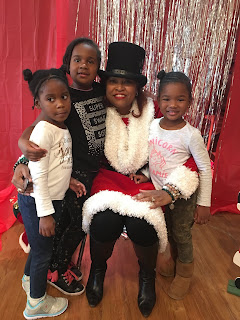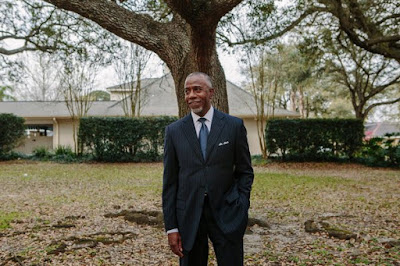I have had the opportunity to meet and interview several amazing women who are change agents through the years. Here are a few who are political trailblazers who are making us skip, hop, run or drive to the polls to vote early like never before to exercise our most precious civic duty...voting!
Stacey Abrams, a native Mississippian who was raised in Georgia, is seeking to lead the state of Georgia as Governor. Her willingness to fight a political system that has been exposed as bias at every turn has many of us wondering what shoe will drop next. She has been fierce and steadfast through it all. And, she has inspired millions of to go to polls to vote early in Georgia and around the nation.
Stacey Abrams
Stacey Abrams
and her five siblings grew up in Gulfport, Mississippi with three
tenets: go to school, go to church, and take care of each other. Despite
struggling to make ends meet for their family, her parents made service
a way of life for their children – if someone was less fortunate, it
was their job to serve that person. This ethic – and her parents’
unwavering commitment to providing educational opportunity for their
children – led the family to Georgia.
Stacey’s
parents attended Emory University to pursue graduate studies in Divinity
and become United Methodist ministers. Stacey and her younger siblings
attended DeKalb County Schools, and she graduated from Avondale High
School. Stacey received degrees from Spelman College, the LBJ School of
Public Affairs at the University of Texas, and Yale Law School.
She put her
education to work to better the lives of Georgians through the
government, nonprofit, and business sectors. Dedicated to civic
engagement, she founded the New Georgia Project, which submitted more
than 200,000 registrations for voters of color between 2014 and 2016.
Under the pen name Selena Montgomery, Stacey is the award-winning author
of eight romantic suspense novels, which have sold more than 100,000
copies. As co-founder of NOW Account – a financial services firm that
helps small businesses grow – Stacey has helped create and retain jobs
in Georgia. And through her various business ventures, Stacey has helped
employ even more Georgians, including hundreds of young people starting
out.
(https://staceyabrams.com)
When many women groups said 'no' when Tamika Mallory called in late 2016 to organize a women's march for early 2017, their "no, not now," did not deter her. She went to become part of the largest protest movement that was held in U.S. and around the world. Her vision and determination to stay focus has been an inspiration to women of all ages and backgrounds.
Tamika D. Mallory
Tamika D. Mallory is a mother to her
teenage son, an esteemed social justice leader, advocate, activist and a
member of The Metro-Manhattan (NY)
Chapter. A New York City native, this fiery,
outspoken advocate for human rights and liberty has remained a consistent
fixture in the civil rights movement throughout the years. The 36 yr old has
been applauded as an advocate for civil rights issues, equal rights for women,
health care, gun violence, and police misconduct. Tamika has been applauded as
“a leader of tomorrow” by Senior Advisor to President Barack Obama, Valerie B.
Jarrett and was selected to serve on the transition committee of New York City
Mayor-Elect Bill de Blasio. Her astounding, integrity driven leadership and
campaign for equality and judicial reform has deemed Tamika a significant
force amongst government officers, policy makers and other community advocates.
From her position as the former
Executive Director of the National Action Network to her instrumental role
in creating New York City’s Crisis Management System, an official gun violence
prevention program that awards nearly $27 million to violence prevention
organizations annually; Tamika is stitched into the fabric of the new
revolution for civil rights. However, it was when Ms. Mallory stepped onto the
public stage as one of four co-chairs for the Women’s March on Washington
that she became internationally recognized as an integral voice for civil
rights, social justice and the new wave of feminism. The Women’s March was
recorded as having participation from 5 million people worldwide, thus
landing Tamika on the 2017 Time 100 Pioneers list as well as Fortune’s
2017 list of the World’s Greatest Leaders.
(www.tamikadmallory.com)
Speaking truth to
power in an era that has many of our seasoned leaders stating, “We have been
here before and we are not going back.” Congresswoman
Frederica Wilson, D. 24th District has been that voice. Many
know of her work not only to her Floridian constituents but she has proven to
be a fierce supporter of military families, a difference maker and a role model
who gives voice to the voiceless.
 |
| Congresswoman Frederica S. Wilson with Daughters of Destiny |
Congresswoman Frederica S. Wilson
proudly represents one of the most ethnically and culturally diverse districts
in the nation and includes parts of northwest Miami-Dade and southern Broward
counties.
Recognizing her record of service and productivity, in 2010 voters
overwhelmingly elected her to serve in the U.S. House of Representatives. As a
former educator, elementary school principal, community leader, school board
member, state legislator, and founder of the 5000 Role Models of Excellence
Project, Congresswoman Wilson earned a reputation as a “Voice for the
Voiceless.” Her tenure in Congress, now in its fourth term, also has been
marked by her signature spirit of unrelenting advocacy on behalf of the less
fortunate.
The Florida lawmaker has continued her mission to improve the quality of
life for her constituency by creating jobs with dignity, improving education,
stopping home foreclosures, safeguarding Medicare and Social Security, and
strengthening ties with Haiti and the Caribbean.
As the Ranking Democrat on the Education and Workforce Protections
Subcommittee in the 114th Congress, Congresswoman Wilson introduced the
American Jobs Act of 2013.
This
innovative bill that promotes full employment and boosts workforce development
opportunities; the Student Loan Borrower Bill of Rights, which would provide
vital relief to overburdened student loan borrowers; and the Youth Corp Act of
2013, which reconnects youth with education, the workforce and their
communities. She has also sponsored legislation to reduce homeowners’ insurance
premiums, protect foster children, and defend Haitian women against
gender-based violence. In addition, the lawmaker, whose mantra is “Jobs, Jobs,
Jobs,” hosted one of the state’s largest job fairs, which connected thousands
of Floridians to more than 100 local and national employers.
Congresswoman Wilson is the founder of the Florida Ports Caucus, a
bipartisan coalition formed to help pass the Water Resources Reform and
Development Act. After being stalled for 12 years, the GOP-led Congress in a
bipartisan vote passed the bill in 2014. As a result, her district was awarded
billions of dollars in capital funding for major projects like the Port Miami
Tunnel, which created thousands of jobs. It also highlighted the lawmaker’s
ability to successfully work across party lines.
Congresswoman Wilson has consistently secured resources for various projects
in her district, including a $1 million grant in 2014 to help reduce crime in
Miami-Dade County’s highest crime area, the Northside District. The Department
of Justice grant will bolster the Miami-Dade Police Department’s ability to
combat crime and violence and make the area a safer place to live,
work, and raise families. During her tenure, the district
has received $3.1 billion in grants, contracts, and other assistance. In May 2015,
Congresswoman Wilson was appointed to the advisory council of President Barack
Obama’s “My Brother’s Keeper” Alliance, a public acknowledgement of the
life-changing results for boys and young men of color that she has achieved
through the 5000 Role Models of Excellence Project. President Obama often cites
this program, which she created nearly a quarter century ago, as an example of
the kinds of projects that his “My Brother’s Keeper” initiative is designed to
emulate and support. Congresswoman Wilson also is founder and chair of the
Congressional Black Caucus’s “My Brother’s Keeper” Task Force.
Congresswoman
Wilson understands Congress’ role as a global leader in human and civil rights
and has led its efforts to fight for the safe return of the 219 Nigerian
schoolgirls still missing since their June 2014 abduction by Boko Haram and to
aid in the defeat of the terrorist group. In addition to participating in two
fact-finding missions to Nigeria and passing two resolutions, she has been a
leading voice in a daily, international Twitter campaign to #BringBackOurGirls.
The Florida lawmaker also created “Wear Something Red Wednesdays,” a weekly
photo opportunity and press event with congressional leaders and lawmakers. The
initiative helps to ensure the girls are not forgotten by maintaining media
attention and pressure on U.S. and Nigerian officials to honor their pledge to
do all they can to rescue them. A leading political newspaper has dubbed her
relentless attention to this human rights crisis “Frederica Wilson’s War.”
The Florida lawmaker has worked tirelessly to recognize Americans who have
made significant contributions to our nation. She ushered through legislation
in record time to memorialize a new Federal Bureau of Investigation building in
honor of Special Agents Benjamin P. Grogan and Jerry L. Dove, who were killed
in what is considered the “bloodiest shootout” in FBI history. Most recently,
she passed legislation to rename a Miami post office in honor of Father Richard
Marquess-Barry, a pillar of the community and one of South Florida’s most
influential and unifying faith-based leaders.
After earning a Bachelor of Science degree in elementary education from Fisk
University and a Master of Science degree in elementary education from the
University of Miami, Congresswoman Wilson worked as a teacher and assistant
educational coordinator for the Miami-Dade County Public Schools Head Start
program. She quickly rose to become principal of Skyway Elementary School,
which was recognized as one of the best schools in America in President George
H. W. Bush’s “America 2000” plan to upgrade national education standards.
In addition to raising academic standards and expectations, Congresswoman
Wilson taught her students the power of advocacy. Their target was a compost
plant built across the street from Skyway that emitted odors that posed a major
health and environmental hazard and distracted the children from their studies.
She and her students mobilized their community and lobbied government and
school board officials until they achieved their goal. The compost plant closed
its doors just short of two years after its opening.
The experience highlighted the need for stronger local leadership and led
Congresswoman Wilson to successfully campaign for a seat on the Miami-Dade
County School Board in 1992. Her first legislative achievement was the
establishment of the 500 Role Models of Excellence Project as a
district-sanctioned program. The innovative mentoring program was inspired by
the extraordinary impact of positive male influence on the attitudes and
performance of the boys at Skyway Elementary during her tenure as principal.
Now known as the 5000 Role Models of Excellence Project, the program has
flourished and earned much-deserved national acclaim.
The 5000 Role Models of Excellence Project has awarded millions of dollars
in college scholarships to help hundreds of young men achieve their dream of
earning a college degree or post-secondary certification. In 1997,
President Bill Clinton honored the program, which today serves more than 8,000
students each year, with the Teaching Example for the Nation Award at the
Summit for America’s Future.
As a state legislator, she worked with Governor Jeb Bush to remove the
Confederate flag from the State Capitol and passed a bill mandating HIV/AIDS
testing for prisoners upon their release and linking them to care in the
counties where they relocated. She also passed a bill that made rape in prison
a felony crime. Other legislative achievements and priorities included
relocating women in Florida prisons to facilities that would enable them to be
closer to their children while serving out their sentences; opposing
high-stakes testing; pushing for a ban of the term “illegal alien” in state
public records; and partnering with Governor Charlie Crist to restore voting
rights for ex-felons.
We could not shine a
spotlight on women leading movements and speaking truth to power and not share
the historic and sheroic efforts of Black women in Alabama in 2017. They said no to institutional racism,
sexism, classism, pedophilia, homophobia, xenophobia and God knows what else,
by challenging the living and those who were spiritually dying to wake up and
hold elected officials accountable for their actions, past and present. Black women in Alabama showed our country that the clap back to systemic
racial discord will be addressed in the voting booth and our votes will not be
taken for granted. Our sisters’ voting power revealed that going forward, the
Black community and people of African descent are at the table not on the menu
in 2018.
Black Women Voters in Alabama (Past and Present)
by Kerra Bolton
When Doug Jones won Alabama’s hotly contested Senate special election
on December 12, 2017, observers on Twitter were quick to point one thing out:
Jones’s victory was most likely due to high black turnout,
particularly
among black women.
Despite fears of the reduced turnout often seen in an off-cycle elections,
belief that the Jones campaign made missteps in its black outreach, and
concerns that
voter
suppression tactics in the state could reduce the number of black voters
able to cast ballots, black voters made a commanding display of political power
on Tuesday night, according to preliminary exit polls. In a state where African
Americans usually make up one-fourth of the electorate, the initial exit polls
suggested that they
exceeded
that turnout rate, with early numbers putting them at 30 percent of
Tuesday’s electorate.
The numbers will be in flux for a while,
as
Dara Lind writes for Vox, but an
exit
poll from CNN found that 96 percent of black voters went for Jones in the
election. And a
demographic
breakdown of exit polls published by the Washington Post went viral on
Twitter, showing that black women, an estimated 17 percent of the Tuesday night
electorate, supported Jones by a 98-2 margin.
Observers noted that the result was a powerful reminder of the power of
black women’s votes. The results also come months after the Democratic Party
engaged in a highly public debate about the significance of “identity
politics,” with some arguing that the party was
taking
black women for granted as it pursued the votes of working-class white
voters.
Alabama’s Senate race isn’t the first election this year where a strong
turnout among black voters, led by black women, helped determine an election.
In a performance that closely matched their
2013
behavior in the state, black women in Virginia helped keep the governor’s
mansion in Democratic hands, with
91
percent of their vote going to Ralph Northam last month. They also showed
the
strongest
support for the winning Democratic gubernatorial candidate in New Jersey.
And while Hillary Clinton did not win the 2016 election, black women
overwhelmingly supported her, backing her by a 94-6 margin over Donald Trump
and other candidates.
On social media on election night, some observers noted that black women
were voting for Doug Jones in an effort to “save America,” which some critics
argued puts too much of a burden on black women.
But in a state where a disproportionate level of
African-Americans
face
rampant poverty, poor education systems, and unequal access to healthcare, the
votes of black women were not about some altruistic mission to save America
from itself. Their votes were a very real attempt to make a change
that
would help themselves and their families.
They were also counteracting
a candidate who
argued
that America was last “great” when slavery was in place,
responded
affirmatively
when asked if constitutional amendments after the 10th should be abolished, and
was backed by a president who has engaged in
vitriolic
attacks against prominent black women while pursuing legislation that would
harm them. The results outline why they were such a powerful political force
that should be focused on beyond election season.
Alabama’s Senate race is only the latest election in which black women made
the difference. If their high levels of turnout remain surprising, it is
because we are not looking to them in the first place.
Photos: supplied














































